2018 NAEd/SPENCER DISSERTATION FELLOWS
Abdul Kayum Ahmed, Teachers College, Columbia University

A. Kayum Ahmed is a Ph.D. candidate at Teachers College, Columbia University and an Adjunct Faculty member at Columbia Law School where he teaches classes on socio-economic rights, as well as African law, literature and politics. Before joining Columbia, Kayum served as Chief Executive Officer of the South African Human Rights Commission from 2010 to 2015. During his term at the Commission, Kayum led a team of 178 colleagues to monitor, protect and promote human rights in South Africa, and oversaw the management of nearly 45,000 human rights cases.
Just before relocating to New York and in anticipation of his existential (read: mid-life) crisis, Kayum and his amazing wife travelled across the African continent from Cairo to Cape Town over nearly 100 days. He holds various degrees in law from the University of Oxford (MS.t), Leiden University (LL.M.), and the University of Cape Town (LL.B.), as well as degrees in anthropology (M.A.) and theology (B.A. Hons.).
Kayum’s Ph.D. research on radical student movements intersects with his commitment to social justice activism. Following his involvement in anti-white supremacist protests at Columbia where he faced disciplinary action, Kayum was placed on a right-wing “Professor Watchlist” for advancing “leftist propaganda in the classroom.”
#RhodesMustFall: Decolonizing Education, Performative Pedagogy and Epistemic Disobedience
When a black student threw feces against a bronze statue of British imperialist, Cecil John Rhodes, located at the University of Cape Town (UCT), it sparked the formation of the #RhodesMustFall (#RMF) movement in 2015. The black student-led #RMF movement sought to decolonize UCT by confronting institutional racism and patriarchy through a series of disruptive tactics. In order to make sense of their experiences in a predominantly white, liberal university, black students began de-linking from the dominant model of Euro-American knowledge, adopting pan-Africanism, black consciousness and black radical feminism as a decolonial framework. This process of de-linking or “epistemic disobedience”, generated an emergent idea of “Fallism” following the fall of the Rhodes statue. Students argued that Fallism disrupted dominant knowledge structures through its radical, performative pedagogy. Furthermore, students at Oxford University who were inspired by #RMF created the #RMF Oxford movement that also focused on decolonizing the university. This exportation of Fallism from the South to the North—from the colonized to the colonizer—constitutes a “theory from the south.” By adopting epistemic disobedience as a conceptual framework, I argue that Fallism can be constructed as an emergent theory generated through a dual process of de-linking and performative pedagogy.
Jamie Amemiya, University of Pittsburgh
Jamie Amemiya is a doctoral candidate in the Developmental Psychology program at the University of Pittsburgh. Her research investigates how school contexts can support healthy psychosocial and academic development during adolescence. She integrates developmental, educational, and social psychology perspectives in her work. Her research has been published in Journal of School Psychology, Child Development Perspectives, and Journal of Research on Adolescence. Her current research focuses on how adolescents reason about and respond to academic and disciplinary feedback from teachers. She is especially interested in understanding these processes among adolescents from groups that have been historically stigmatized in school settings, such as racial and ethnic minority adolescents. Ultimately, she hopes that her research will inform how schools can better serve an increasingly diverse student population.
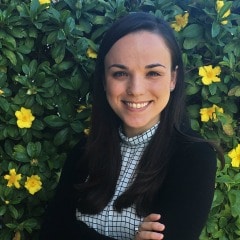
Are Infractions for Minor Misbehavior Detrimental to Adolescents’ School Functioning? A Correlational Study of Developmental Processes and Individual Differences
Although minor misbehavior is a natural byproduct of adolescent development, such misbehavior may be met with harsh punishment at school. For example, teachers may give adolescents official write-ups for minor misbehavior (i.e., “minor infractions”) to discourage future misbehavior. Though educators may believe that minor infractions will deter misconduct, theorists from developmental and social psychology perspectives argue that minor infractions will negatively impact adolescents’ school functioning in several ways. Adolescents may perceive minor infractions as overcontrolling and, in turn, react with defiant behavior that results in greater suspensions. This process may be exacerbated among adolescents who are already wavering in their connection to school. Moreover, teachers’ use of minor infractions may unfairly target and disproportionately affect racial minority adolescents. To investigate these hypotheses, this dissertation uses a rich longitudinal dataset of 729 adolescents’ school record and survey data over the course of one school year. Two longitudinal analytic strategies, latent class analyses and multilevel modeling, are used to test these hypotheses. With this dissertation, Jamie aims to uncover the developmental processes that may lead to more extreme punishments such as suspensions. Results may also elucidate where teacher professional development programs should focus their efforts, such as helping teachers adopt more culturally and developmentally sensitive behavior management practices.
Cameron Anglum, University of Pennsylvania

Cameron Anglum is a Ph.D. candidate in Education Policy at the University of Pennsylvania. He pursues an interdisciplinary line of research in economics of education, school finance, and urban public policy focused particularly on policy effects experienced by disadvantaged students and the communities that serve them. In particular, Cameron uses quasi-experimental methods of analysis to examine how American governments at the local, state, and federal levels invest in inputs to K-12 public education, the largest public expenditure at the state and local levels. His prior work has examined equity and adequacy considerations in school finance reforms, technology integration in urban schools, and reforms to school discipline policies. His dissertation research examines school district debt issuance, credit constraints, and their relationships with school capital investments, investments which have been shown to improve a range of important public policy outcomes. Previously, Cameron earned a B.A. in Economics and an M.S.Ed. in Education Policy both from the University of Pennsylvania.
Credit Constrained? How the Cost of Capital Affects District Resources and Student Achievement
In recent years, school finance research has extensively augmented the body of empirical evidence concerning the effect of various school finance reforms, much of it revealing the important role of resources on outcomes for economically disadvantaged students. This study focuses on an aspect of school finance which remains largely unaddressed by the public policy literature, namely the relationship between school district credit constraints, crucial investments in public schools, and underserved student populations. By leveraging an exogenous shock to district borrowing capacities, this paper seeks to estimate the effects of how such changes affect district debt issuance, school resource provision and allocation, and student achievement. District debt issuance, which has grown substantially in recent decades, regularly finances investments in the physical infrastructure of public schools, investments which may improve student achievement, local property wealth, and other public policy outcomes. Such investments, however, are made by school districts characterized by a wide distribution of credit profiles and quality of existing infrastructure, attributes that vary widely by district urbanicity and student socioeconomic traits. To further examine these disparities, this study will shed light on the role of credit constraints in school investments and the role district debt may play in school resource provision and student achievement across varied geographic areas and diverse student populations.
Gwen Baxley, University of Wisconsin-Madison
Gwendolyn S. Baxley is a scholar in the department of Educational Leadership and Policy Analysis at the University of Wisconsin-Madison. Drawing on critical qualitative and quantitative methodologies, her research explores educational spaces in which Black youth and families survive, thrive and navigate and the role of race within these contexts. Baxley specifically investigates how school and community leaders cultivate nurturing, affirming spaces for Black youth as well as the structures, practices, ideologies that facilitate or hinder the development of such spaces. Her current research projects critically explore school-community-family initiatives, with an emphasis on historical and contemporary community schooling. Baxley’s research has been informed by her experience teaching within art-based out-of-school time contexts and more recently as an evaluator and consultant for numerous school-community-family partnerships. Baxley is a Barbara L. Jackson Scholar, David L. Clark Scholar and Wisconsin Collaborative Education Research Network Fellow.
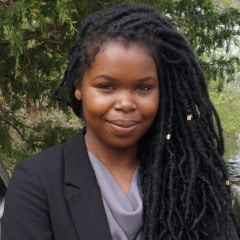
How School Leaders Make and Enact Meaning: A Qualitative Study of Racial Discourse, Opportunity and “Humanity” in Community Schools
Full-service community schools — community-school partnerships that emphasize community-driven, holistic and asset-based school ideals — are increasingly implemented across the nation as a means to assist school stakeholders in addressing racial disparities and countering deficit, dehumanizing narratives of minoritized groups, including Black children. Yet, little attention in educational research has been paid to: 1) how implementing this asset-based initiative complements, contradicts or shifts school stakeholders’ ideologies about black children and their experiences and 2) how this meaning-making shapes community school implementation. Through a critical case study of community school efforts in a Midwestern district, I examine the racial meaning-making among school leaders and stakeholders in a district experiencing heightened and persistent racial and structural inequities; I explore the everyday ways such meaning-making manifests in the norms, practices and ideals of community schooling. Such analysis is particularly merited given the expansion of and attention to full-service community schools across the nation with the reauthorization of ESSA.
Sade Bonilla, Stanford University
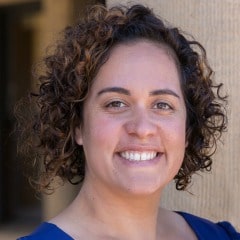
Sade Bonilla is a doctoral candidate studying the economics of education at Stanford University. She is an Institute of Education Sciences (IES) pre-doctoral fellow and recipient of the Association for Public Policy Analysis and Management (APPAM) Equity Inclusion fellowship. Her research focuses on K-12 education policy with an emphasis on high school to college transitions and career and technical education. Prior to her doctoral studies she was a Harvard Strategic Data Project (SDP) fellow with Albuquerque Public Schools. As a doctoral student she has prioritized conducting research through research-practitioner partnerships with school districts and states. Sade received a M.A. in Economics from Stanford University, an A.M. in Urban Education Policy and A.B in Public Policy and Education Studies from Brown University.
The Effects of Articulated Career Pathway Reforms for High School Students
The economic and social consequences of failing to obtain a high school diploma are stark. A new generation of CTE models emphasizing articulated career pathways are being pursued by states and localities nationwide in response to stagnating high school completion rates and low-college completion rates. This dissertation will couple descriptive evidence on the dispersion of these new CTE programs and their differential uptake by students with credibly causal evidence on how participation in such programs influences student transitions to college and the labor market. I will identify the causal effects of these programs on students through regression discontinuity (RD) and difference-in-difference (DD) designs that leverage credible quasi-random assignment to career pathways. My dissertation will also provide translational insights relevant to policymakers who may be considering adopting these CTE models (e.g., insights regarding cost-effectiveness and the available evidence on the challenges to a high-fidelity implementation). This work builds on important prior research that has articulated both theories of change and empirical evidence on earlier models of vocational education. These earlier studies, however, focus on vocational course taking and use methods that do not fully account for student selection. This work fills this gap by providing rigorous causal evidence on new career pathway models promulgated by local agencies nationwide.
Jennifer Candipan, University of Southern California
Jennifer Candipan is a PhD candidate in Sociology at the University of Southern California. Her research is broadly interested in social and spatial dimensions of stratification and inequality. Her current work focuses on two particularly salient contexts that contribute to inequalities in children’s outcomes: schools and neighborhoods. Using quantitative and spatial methods, her dissertation examines the links between neighborhood and school composition, with a focus on neighborhoods undergoing economic change, and how neighborhood and school contexts matter for children’s outcomes. In other work, her projects examine dynamics of racial/ethnic transition and neighborhood socioeconomic ascent, the neighborhood context of charter expansion, and links between school choice and segregation in neighborhoods and schools. Her research has previously been funded by an NSF Dissertation Improvement Grant. Jennifer holds a BA in English and an MA in Sociology, also from the University of Southern California.
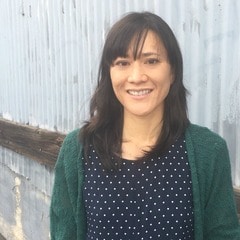
Examining the Changing Neighborhood-School Link in Gentrifying Areas
In earlier decades, nearly all children attended their neighborhood school. Since the 1990s, however, school choice and private school options have loosened this historically tight relationship. Neighborhoods and schools are both key contexts for children’s well-being, and understanding their links provides insight into how inequalities are produced and sustained. Using multiple quantitative data sources, I examine the neighborhood-school link in three key ways: (1) how similar are the racial/ethnic composition of neighborhoods and their local schools over time?; (2) how do neighborhood characteristics and alternatives to local schools affect where families choose to live and enroll their children?; (3) have the effects of neighborhoods on children’s outcomes changed over time, since schools are increasingly less an institution of neighborhoods? To answer the first two questions, I focus on the roles of neighborhood change (particularly gentrification), changing school attendance boundaries, and the availability of non-local school choice options. As neighborhoods gentrify and become (at least temporarily) more socioeconomically and racially diverse, are these compositional changes reflected in the composition of the local school? Do parents moving into these neighborhoods opt out of local schools for choice alternatives? Does the availability of non-local school options entice parents into gentrifying neighborhoods? Then, I examine whether the strength of neighborhood effects on children’s outcomes has changed as consequence of a potentially weakened neighborhood-school link. Collectively, findings inform policies that bear on neighborhoods and schools, and contribute to our understanding of the complex linkages between housing and education markets.
Jessica Chandras, The George Washington University
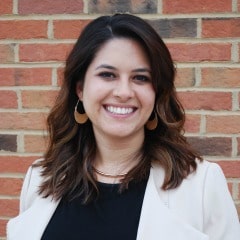
Jessica Chandras is a doctoral candidate in sociocultural and linguistic anthropology at the George Washington University. Her PhD research focuses on the intersections of socioeconomic class, education, and language in Maharashtra, India. Throughout her PhD Jessica has served as an instructor for the Anthropology of South Asia and a graduate teaching assistant for various courses in her department. In the two years prior to starting her graduate studies, Jessica worked as an English teacher in the Basque Country through the Spanish ministry of education, culture, and sport. She also holds a BA with honors from the University of Washington in Anthropology, where she completed a thesis in 2010 on the topic of language and identity among indigenous individuals in Oaxaca, Mexico. Her current scholarly interests extend beyond her dissertation and include multilingual and higher education pedagogy and broadening an understanding and use of ethnographic methods among university students.
Schooling Language: Marathi, the Middle Class, and Education in Pune, India
With a focus on the contemporary urban Indian linguistic landscape in the city of Pune within the state of Maharashtra I present an ethnography of the city through the lens of language use in and about education. By focusing on the contemporary educational and linguistic landscape in Pune, this dissertation examines the ways in which middle class residents assign meaning and value to Marathi (the regional language of the state), Hindi, and English use and how that significance shapes urban middle class subjectivities. While this ethnography portrays negotiations typical of many multilingual societies, Pune emerges as a unique case study due to the caste and class constitutions of the city and a historical significance in the region. In the first chapter of my dissertation, I demonstrate how language shapes social experience and how the meanings assigned to languages are also spatially appropriated. Then, I explore how education, especially a demand for English language education, creates formal and informal linguistic economies that play out in education. The complex manner in which residents choose how and when to use multiple languages in education assigns and transmits subtle messages about those languages to speakers. A formalization and standardization of Indian regional languages, specifically Marathi in this study, lends itself to pedagogical styles that instill and concretize matters of social capital gained from/assigned to language use which I examine in the third chapter. Finally, Marathi, English, and Hindi are intimately and intrinsically connected to aspects of identities. These aspects play out in formative ways in all levels of education but especially in higher education, which I address in the fourth chapter. In higher education more so than in other levels of education, students from more varied backgrounds and different geographic regions live and study together. Through education and in educational spaces, this dissertation documents and analyzes language ideologies and language shifts, viewing social change through the lens of language repertoires. This dissertation ultimately asks in what ways Indian regional languages are viable in contemporary urban multilingual Indian societies.
Maggie Dahn, University of California, Los Angeles
Maggie Dahn is a PhD candidate in the Urban Schooling Division of UCLA’s Graduate School of Education and Information Studies. She is interested in how the design of learning environments can support productive interactions between teachers, students, and materials. Her background as a visual arts teacher informs her research on how students learn in and through the arts, art making and the development of voice and identity, and issues of access and equity in arts education. In related work she explores how art making can be a point of departure for student stories about the emotional experience of learning computer programming. She is also developing ideas that position improvisation as a lens for studying discourse and interaction in science, drawing from her experience working with mixed reality technologies in classroom settings. Maggie holds an M.A.T. from Dominican University and a B.A. from Northwestern University, where she majored in performance studies.

The Weaving of Artistic and Political Voice in Art Making about Social Issues
Threats to reduce or eliminate funding for the National Endowment for the Arts have amplified the question of why art matters, and the arts have long maintained a precarious position in schools. For this dissertation, I expand on the notion that the arts are valuable because they teach how to express one’s voice. I use this platform to study how students developed their artistic and political voices as they participated in a visual arts class focused on making art about social issues. I define artistic voice as how students blend ideas with media to construct representations, political voice is how they articulate ideas about social issues that emerge from their experiences, and by social issues, I mean self-selected topics that impact a larger community and are important to students (e.g., immigration, cyberbullying).
To study this, I returned to the classroom to work with 6th graders, many of whom were my former students. Borrowing methodological tools from the learning sciences, I created an environment that made space for discourse and interaction across what I term conversation spaces. That is, I planned for patterns of discourse so that I could study how students talked about the art they made. These included: (a) personal narratives about social issues, (b) peer critique, and (c) student reflections on presenting their art to the public. This dissertation is significant because it centers student experience at the classroom level to address broader concerns about designing for experiences in the arts.
Sherelle Ferguson, University of Pennsylvania

Sherelle Ferguson is a PhD candidate in the Department of Sociology at the University of Pennsylvania. Her research interests revolve around stratification and mobility in educational institutions with a focus on the role of cultural processes and social network inequality. Specifically, she studies how class-based and race-based cultural and social resources shape how individuals navigate institutional standards. Her dissertation uses qualitative methods to investigate how non-economic factors contribute to inequality in higher education. Prior to her doctoral studies, Sherelle taught high school history at a charter school in Massachusetts. She holds an A.B. in Social Studies from Harvard University and an Ed.M from Harvard Graduate School of Education.
College Chutes and Ladders: How Undergraduates Navigate Contingencies and Institutional Demands
Whether we look at academic performance or retention and graduation rates, less economically advantaged students and black, Latino, and Native American students do not fare as well as their peers. Researchers have pursued a number of explanations including income disparities, academic underpreparation, and students’ resilience in the face of challenges. While each of these factors are important, they primarily focus on individual attributes. Yet, success in college partly depends upon how educational institutions reward students’ activation of social and cultural resources. As such, this study investigates how undergraduates’ ability to employ cultural knowledge and mobilize their social networks shapes their academic trajectory.
Over two years, I conducted ethnographic observations and in-depth interviews with a socioeconomically and racially diverse sample of undergraduates and university staff at “Sullivan University”, a private four-year college. I analyze how undergraduates problem-solve in order to reveal contingencies in the transmission of inequality. Further, this study highlights the “rules of the game”—organizational procedures and informal norms—to analyze how students’ cultural repertoires align with institutional demands. This study contributes to higher education and stratification literature by revealing various pathways to reproduction and mobility while identifying the role of universities’ organizational procedures in students’ successes and failures. Investigating how individuals manage institutional demands is part of answering the evergreen question: Who is successful here and why? This question becomes ever more important for postsecondary education as the cost of tuition skyrockets and returns to a college degree increase.
Clare Flack, Teachers College, Columbia University
Clare Buckley Flack is a doctoral candidate in sociology and education in the Department of Education Policy and Social Analysis at Teachers College, Columbia University. Her research interests in the sociology of teaching include teacher working conditions, turnover, and occupational status. In the sociology of curriculum, her work explores the epistemology of school knowledge and the role of curriculum and instruction in the reproduction of inequality. She also studies the challenges of implementing educational policy, particularly standards-based reform and professional learning initiatives. She holds an A.B. in sociology from the University of Chicago, where she also earned a Master of Arts in Teaching (M.A.T.) from the Urban Teacher Education Program (UChicago UTEP). Prior to beginning her doctoral studies, she taught bilingual self-contained sixth grade in Chicago Public Schools and sixth grade earth science at a charter school for immigrants and refugees in Atlanta.

Pedagogy of Performance: The Impact of Scripted Curricula on the Occupational Habitus of New York City Teachers
Despite longstanding professionalization efforts, the occupational status of teachers in the United States remains uncertain and contested. Classic professionalists understand teaching as intellectual work requiring considerable abstract knowledge. New professionalists see teaching as a craft of performance, an understanding that undergirds the rise of more scripted forms of curricula in response to the demands of standards-based reform. Such curricula are increasingly prevalent in no-excuses charter networks, but use is expanding, particularly in schools serving low-income children of color. Most studies of scripted curricula focus on students; less is known about effects on teachers. Although conventional wisdom holds that scripted curricula are deprofessionalizing, they may enhance a reimagined teacher professionalism, relieving burnout and enabling focus on students’ socioemotional needs or pedagogical refinement. Also, scripted curricula may supply educational infrastructure that builds coherence, grounds teacher development, and fosters school improvement. Finally, curriculum development offers one potential professional career ladder for teachers. Among the first studies of scripted curricula to incorporate quantitative methods, this mixed-methods, quasi-experimental dissertation examines the development and implementation of more scripted curricula by two New York City school support networks (one charter and one non-charter). Semi-structured interviews and observations of professional development complement a population survey of network teachers. Data analysis will examine associations between school environment, teacher characteristics, level of scripting, and uptake of curricula with measures of teacher occupational habitus, including autonomy, knowledge, self-efficacy, school-level policy influence, and job satisfaction. Findings are relevant for researchers and policymakers interested in teachers’ occupational status and its labor market implications.
Virginia Flood, University of California, Berkeley

Virginia J. Flood is a Ph.D. candidate in Education at the University of California, Berkeley. She investigates the fine details of the interactional methods and resources that Science, Technology, Engineering, and Mathematics (STEM) students and instructors use to understand one another while working together in technology-rich learning environments. Prior to her doctoral work, Virginia earned a B.S. in Biochemistry at the University of Southern Maine and a Master of Science in Teaching degree at the University of Maine. At UC Berkeley, she received a Berkeley Fellowship and a Research in Cognition and Mathematics Education Fellowship to support her graduate work. Virginia’s current research aims to better understand how learning to program and debug computers is socially organized, with a focus on the specific roles that forms of embodied communication like gesture play in this process. She is a proud member of the Embodied Design Research Laboratory at UC Berkeley, the Co-Operative Action Lab at UCLA, and the Debugging Failure project.
Learning How to Debug: Productive (and not so Productive) Interactions in the Classroom
In my dissertation, I investigate how students learn to debug computer programs through interactions with more-experienced peers and instructors during a summer programming course. As demand for programming literacy increases, we still know surprisingly little about how programming is learned in face-to-face interactions. Debugging is an integral, challenging part of programming and consists of a set of practices that are often not explicitly taught. Instead, these practices are passed down through informal interactions with more experienced programmers. Involving abstract objects and processes, debugging is also extremely difficult to communicate to newcomers and requires situated, embodied communicational methods like gesture to make ideas publicly available. However, education research on debugging has left these complex interactions between newcomers and more experienced programmers unexamined. Using video recordings of peer-to-peer and student-instructor debugging encounters, my microethnographic study addresses this gap in our knowledge by examining both in-the-moment and longitudinal processes of learning to debug through social interaction. Informed by cultural-historical and ethnomethodological approaches to learning as a situated, social activity, I will illuminate how opportunities to learn to debug are enabled or constrained over the course of single debugging encounters and how students’ debugging practices change over time across multiple encounters. By identifying and characterizing productive and unproductive forms of interaction for learning to debug, my study will inform the design of programming learning experiences and have implications for instructional practices.
Benjamin Fogarty-Valenzuela, Princeton University
Benjamin Fogarty-Valenzuela is a Ph.D. candidate in Anthropology at Princeton University. He specializes in Cultural, Political, and Visual Anthropology, with an ethnographic focus on youth, education, the war on drugs and middle class identity. His research brings an anthropological perspective to social mobility, youth aspiration and the politics of free time in contemporary Brazil. In his anthropological studies, Benjamin has focused on the social and cultural effects of pedagogies of drug prohibition as they intersect with policies of social inclusion and citizenship formation in Latin America. Of Guatemalan-American descent, Benjamin witnessed the effects of transnational processes such as NAFTA, the drug war and deportations from both sides of the border, motivating him to join Americorps as a Community Health Instructor and to study political thinking and photography at Bard College before transferring and receiving his B.A in socio-cultural anthropology with an Honors Thesis at Columbia University.
Benjamin’s dedication to socially engaged work is twofold. On one front, he works towards an engaged anthropology as a co-founder and facilitator of Catalyst: Youth Voices Rethink the War on Drugs, the first innovative United World College short-course of its kind (funded by OSF) that brings together youth from across the Americas to critically examine their interconnected lives as imbricated in this transnational conflict. On the other front, his commitment to rethinking teaching and learning beyond the classroom resulted in the current documentary film and trans-media project with Princeton University’s Visual Ethnography Lab that draws from his fieldwork from the inside of one of the over 1,000 public high school occupations that extended across Brazil and into neighboring countries during 2015 and 2016.

Pedagogies of Occupation: Youth Aspiration, Social Mobility and the Politics of Time
My dissertation project explores how Brazilian education policy-makers and corporate actors have framed youth free time as a ‘gateway drug,’ and how keeping youth busy through various interventions—vocational training, after-school arts and sports, test prep and professionalizing programming — has become a widespread form of risk prevention and subject formation. Drawing on two years of ethnographic fieldwork in Rio de Janeiro, Brazil, my dissertation examines how, and to what effect the imperative to manage youths’ free time in the name of prevention sets up a political field in which state, corporate and various nongovernmental actors can frame and justify interventions in the lives of Brazilian youth. Time management interventions can now instruct youth on how to become punctual and industrious citizens, scheduling their aspirations while stigmatizing their leisure. The dissertation investigates how low-income youth in Rio de Janeiro have come to participate in such interventions—largely couched in neoliberal ideas of individual responsibility and carried out by public-private partnerships—and the ways in which youth subvert and redirect these interventions and middle-class social identities into new forms of personhood and political agency.
In 2016, a youth movement of over 1,000 autonomously run public school occupations (or encampments) swept into my field site. In response, I extended my focus on the occupation of time as a means to secure professional occupations in order to include protest occupations within the same analytical frame. Building on the Latin root word Ocŭpo, meaning “to seize/capture/gain/take possession/fill,” my dissertation introduces the concept “pedagogies of occupation” to analyze the politicized arena of youth free time across Latin America.
Katelyn Heath, Cornell University

Katelyn Heath is a Ph.D. candidate in Economics in the Department of Policy Analysis and Management at Cornell University. Her primary research interest is in the economics of education with a particular emphasis on students with disabilities. Katelyn’s dissertation focuses on the causal effects of special education programs on short- and long-run student outcomes, including performance on state standardized exams, post-secondary schooling, and labor market earnings. Her work applies econometric methods to a large, linked administrative data set to quantify the short- and long-run impacts of special education for students with disabilities on these future outcomes. Before beginning her graduate studies, Katelyn graduated Summa Cum Laude with a Bachelor of Science in Mathematics and Economics from Saint Michael’s College.
The Effects of Special Education Policy on Short and Long-run Student Achievement
Special education is a rapidly growing, increasingly expensive component of public education, and yet little is known about the causal impact of special education enrollment on student achievement. In 2004, the Texas Education Agency introduced the Performance Based Monitoring Analysis System (PBMAS). This policy included an indicator that monitored the percent of students in special education. Before the policy, in 2003-2004, the statewide average percent of students in special education was 12 percent. As of 2014-2015, the statewide average had fallen to about 8.5 percent. To examine the effects of the PBMAS policy, I utilize restricted-access data from the Texas Schools Project housed at the University of Texas at Dallas. This data set contains de-identified administrative records for all public school students from the Texas Education Agency linked to public post-secondary school enrollment records from the Texas Higher Education Coordinating Board, as well as to labor market earnings from the Texas Workforce Commission. I implement a dose response difference-in-differences estimation strategy, which uses the changes in special education brought about by the PBMAS to estimate the effect of special education status on student performance on state standardized exams, high school graduation rates, post-secondary attainment and quality at public universities in Texas, and earnings in the Texas labor market.
Kelsey John, Syracuse University
Kelsey John (Diné) is a Ph.D. candidate in the department of Cultural Foundations of Education at Syracuse University and a former National Science Foundation Graduate Research Fellow. She is Diné and her clans are tł ááshchi’i báshíshchíín, and bit’ahnii dashinálí. Kelsey grew up with a passion for land, horses, and education and pursues the health, healing, and connection of all of these in her service and research. In her research, she uses Indigenous methodologies to center the interconnected relationships of American Indian land, animals, and people for decolonizing settler colonial institutions. Currently, she lives in Farmington, NM and works with a Navajo Tribal University for her dissertation research. When she’s not working, she runs with her dog June bug, spends time riding horses, and hangs out with her family. Alongside her research, she is learning her language—Diné Bizaad (the Navajo language). Her research interests include: Indigenous feminism, Diné studies, settler colonial studies, Indigenous methodologies, and Tribal Colleges and Universities. She is committed to maintaining an active scholarly and service agenda through her volunteer work as a sexual assault advocate at Sexual Assault Services of North West New Mexico and her work as an adjunct faculty for the Diné Studies department at Navajo Technical University.

What Can the Navajo Horse Teach Us about Decolonizing Education?
My dissertation aims to connect Diné and scholarly knowledge at the nexus point of Tribal College and University Institutions (TCUs). To do this, I use Indigenous and decolonizing methodologies to center the Navajo horse as an point of connection, knowledge, and healing in the Diné community. The goal of my dissertation research is to document how the Navajo horse is related to the Diné philosophy of education at existing Navajo Tribal Colleges and Universities, and how Diné might continue learning from horses. For Navajo, centering the horse means centering land, language, culture, relationships, and healing—all of which are foundational to decolonizing educational institutions. By connecting community and traditional knowledge about the horse to Navajo TCUs, this research will help foster stronger curriculum, research, and community outreach at Navajo TCUs. In the future development and dissemination of this research, I hope to build toward an established Diné research methodology for future Diné students, faculty, and communities to use for Diné-centered research that directly informs policy, education, and service on Navajo Nation.
Jenna Kramer, Vanderbilt University
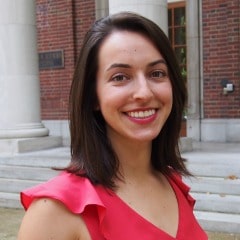
Jenna Weber Kramer is a PhD candidate in the Department of Leadership, Policy and Organizations at Vanderbilt University’s Peabody College of Education and Human Development. Her research leverages quantitative and qualitative methods to examine the effects of institutional and governmental policies on student postsecondary access and success. Prior to Vanderbilt, Jenna worked as a college counselor at a charter high school in Boston. Her work with students to bolster readiness for the postsecondary application and decision-making processes and navigate financial aid motivates her research agenda. Jenna is committed to translating her passion for research into evidence-based public policy, practice, and publicly available resources. She has been named a Curb Center Public Scholar at Vanderbilt for 2018-2019 to work with the greater Nashville community to translate her dissertation findings into resources for local students and families. Jenna earned a bachelor’s degree in Psychology and Spanish from Colgate University.
Supporting Enrollment for College-Intending Tennessee High School Graduates
Increasingly, states are implementing broad-access college scholarships to reduce financial barriers to postsecondary education. Some statewide “Promise” programs go so far as to cover tuition and fees for in-state students. However, financial supports may not be effective as standalone interventions. My mixed-methods dissertation investigates the role of informational supports for college-intending high school graduates who are eligible for free community and technical college in Tennessee. I have been working in collaboration with TN Promise non-profit partner tnAchieves to design, implement, and evaluate a text messaging informational campaign and to facilitate focus groups to learn directly from students about valuable resources and supports for their postsecondary success. For the experimental study, I randomized roughly 18,000 college-intending high school graduates into four experimental conditions in order to determine whether the behavioral framing of informational text messaging affects college enrollment, successful maintenance of TN Promise eligibility, and within- and between-year persistence. This study fine-tunes an empirically tested intervention, text messaging for college-intending high school graduates, in a new context. For the qualitative study, I facilitated focus groups to assess students’ perceptions of the informational supports they receive, the relative utility of available resources, and the challenges they confront during their first year of “free college.” The results of these complementary projects will contribute to the body of research aimed at improving college enrollment and persistence, particularly for first-generation and low-income students at the margins of college enrollment.
Nicholas Kryczka, University of Chicago
Nick Kryczka is a PhD candidate in the Department of History at the University of Chicago, where he researches the history of education, urban history, and the history of racial ideology in the late twentieth-century United States. His dissertation offers a history of Chicago’s magnet schools, tracing the role of voluntary school desegregation in shaping urban multiculturalism in the post-civil rights era. At UChicago, Nick has taught and assisted in courses on U.S. history and African American history, and served as a preceptor for BA thesis candidates in history. Nick has held fellowships from the Black Metropolis Research Consortium, the University of Chicago’s Urban Network, and the Chicago Center for Teaching. As a Senior Teaching Fellow at the CCT, he organizes pedagogy training for graduate student instructors in the History Department. Prior to entering doctoral studies, Nick worked for a decade as a high school teacher in the Chicago Public Schools, where he taught U.S. history, world history, and sociology. Nick earned his teaching licensure and an MA in history at Northeastern Illinois University, and completed his BA in political science at the University of Illinois at Urbana-Champaign. Nick lives on Chicago’s Northwest Side where he volunteers as an advocate for affordable housing and serves as a parent representative on the neighborhood’s Local School Council.

Selective Renewal: Education Markets and Urban Renaissance in Post-Civil Rights Chicago
From their inception in the late 1960s, Chicago’s public magnet schools had a twin mandate: to provide the school system with targeted sites for racial integration and to promote centers of academic innovation and distinction. Mounting pressure from black activists and the federal government had driven the desegregation goal. The latter mandate was designed, as school superintendent James Redmond put it, “to anchor the whites that still reside in the city.”
My dissertation offers an urban history of Chicago’s magnet schools, one of the nation’s earliest experiments in choice-driven school desegregation. I begin with the origin of the magnet concept among civil rights advocates and academic educationists in the 1960s, shifting to a story of implementation in specific Chicago neighborhoods during the 1970s and 80s. The dissertation offers three interventions. Firstly, it documents the broader civil rights and “urban crisis” context that generated the concepts of school choice and selective enrollment in American school systems. Here the project intervenes in history of education scholarship, tracing a mottled origin story for twenty-first century educational watchwords like equity, excellence, and choice. Secondly, by placing educational policy at the center of spatial histories of late-twentieth-century cities, I demonstrate the role that schools played in processes of renewal in the urban core. Here, the project intervenes with urban and metropolitan histories of crisis and renewal, arguing that Chicago’s attempts to avoid postindustrial decline subsumed a variety of public initiatives, including reforms in public education. Thirdly, the dissertation presents urban magnet schools as ideal sites for mapping the role of the state in shaping middle-class values—like diversity and academic competitiveness—in the post-civil rights era. Here I converse with cultural and intellectual histories of the late-twentieth-century U.S., proposing that childhood, parenthood, and neighborhood afford a bottom-up view of how markets, multiculturalism, and meritocracy developed side-by-side in America’s urban schoolhouses.
Alison Laurence, Massachusetts Institute of Technology

Alison Laurence is a doctoral candidate at M.I.T. in the interdisciplinary History, Anthropology, and Science, Technology, and Society program. Informed by work experience in history and natural history museums, her research focuses on the politics inherent in museum exhibition and similar practices of display. Employing the methods of cultural, environmental, and public history, her work attends to questions of voice, agency, and authority and queries not only what is communicated, but also what is obfuscated through exhibition. Her collaborative work has appeared in the open-access History of Anthropology Newsletter and Anthropocene Curriculum. Prior to doctoral research, Alison earned a B.A. in Classics from Brown University and an M.A. in History and Public History from the University of New Orleans.
A Conservative History of Deep Time: Learning from Extinct Animals in the Modern United States
Long extinct animals have a powerful hold on the popular imagination. They are thus effective, persuasive, and potentially dangerous didactic instruments. My dissertation, based on archival research in museums and libraries across the United States, offers a historical assessment of exhibitions staged from the early twentieth century to the present that featured dinosaurs and other long extinct animals as the main attractions. Scholars of the “animal turn” have argued that nonhumans have long been used as charismatic tutors, imparting scientific lessons as well as social instructions. This dissertation contributes to scholarship that emphasizes the significance of animals as vehicles for education, while shifting the focus to extinct creatures. I examine a wide variety of exhibit settings, including natural history museums, world’s fairs, national monuments, shopping malls, and more to capture the perspectives of heterogeneous communities that have deployed extinct animals—at once mute and mutable icons—to support scientific, nationalistic, commercial, and religious narratives. Of the diverse exhibits considered, I ask two guiding questions. What do these extinct animals teach audiences about a planetary past? And how do these extinct animals simultaneously instill lessons about the present moment? More than a history of extinct animals in popular culture, this comparative study offers a historical perspective on long-contested issues of American identity, heritage, and representation, demonstrating the ways in which extinct animals have been used to weigh in on these entirely human categories.
Emily Lyons, University of Chicago
Emily McLaughlin Lyons is a Ph. D. Candidate in Comparative Human Development at the University of Chicago. Her research is aimed at understanding how classroom environments, individual psychological processes and instruction together impact achievement outcomes in K-12 settings. She conducts classroom-based studies in a wide range of public, private and charter schools through the greater Chicago area. Her dissertation, which was supported by an NSF Graduate Research Fellowship, examines how experiencing increased pressure during challenging mathematics instruction affects middle school students’ learning, interest and motivation. She holds a B.S. in Biology and Society from Cornell University. Before pursuing graduate study, she taught high school science in Louisiana and New York. As a classroom teacher, she was struck by the extent to which student learning could be impacted by pressure, and this experience formed the basis of her dissertation research.

Stereotype Threat and Evaluative Pressure in the Classroom: Impacts of Stereotype Threat and Evaluative Pressure during Cognitively-Taxing Mathematics Instruction
In the context of an ever-increasing emphasis on school accountability and standardized test performance, students often feel a great deal of pressure at school (Watson, Johanson, & Dankiw, 2014). Coupled with this general evaluative pressure, many students also experience stereotype threat, fear of being judged through the lens of negative stereotypes (Steele & Aronson, 1995). Extensive research demonstrates that stereotype threat and evaluative pressure can harm test performance (Beilock & Carr, 2005; Beilock, 2008; Nguyen & Ryan, 2008). Although students experience stereotype threat and evaluative pressure in everyday learning contexts as well as during testing events (Larnell, Boston, & Bragelman, 2014; Nasir, 2009, 2012), effects on initial learning are less well understood. My dissertation builds upon key understandings of the effects of stereotype threat and evaluative pressure in testing contexts to extend our understanding to encompass how these pressures impact students when experienced during learning opportunities. In a series of three classroom-based experiments, I test how experiencing either or both stereotype threat and evaluative pressure during challenging mathematics instruction impacts middle school student’s learning, interest and motivation. Although pressure during initial learning is understudied, it may have especially far-reaching, even cumulative consequences, as learning is built on a foundation of prior knowledge.
Giselle Martinez Negrette, University of Wisconsin-Madison

Giselle Martinez Negrette is a doctoral candidate in the department of Curriculum & Instruction at the University of Wisconsin-Madison. She holds a B.A. in Modern Languages Teaching from Universidad del Atlántico (Colombia), and an M.A. in Education with a concentration in Bilingual Education & TESOL from New Mexico State University. Giselle has been a teacher for over 15 years in which she has lived and worked in several different countries including Colombia, England, China, Thailand, Mexico and the US. Her research interests are centered on issues of language, equity, and social justice, particularly, in relation to the schooling of linguistically and culturally diverse children in the United States. In her dissertation, she investigates how emergent bilinguals in dual language immersion (DLI) classrooms perceive, enact, and negotiate the tenuous intersections of race/ethnicity, social class position, and language in American school settings. Drawing on ethnographic methods, her research elucidates the intricate processes that young emergent bilinguals engage in as they use language to enact and negotiate their identities and interactions.
Bilingual Ways with Words: An Ethnographic Study of Language and Social Constructions in a Kindergarten Dual Language Classroom
The education of linguistically diverse students has been a constant subject of debate in the US. However, recently, dual language immersion (DLI) programs have emerged in the country as effective ways to bring together language minority and language majority speakers in school settings with the goal of bilingualism and bi-literacy for all. Despite this progress, the proliferation of DLI programs has raised concerns regarding issues of inequity and dissimilar power dynamics in these spaces. Guided by two interrelated research questions, this inquiry explores first, how kindergarten emergent bilinguals in a DLI classroom perceive and respond to socially-constructed notions such as race/ethnicity, social class position, and bilingualism; and second, how kindergarten emergent bilinguals in DLI classrooms enact and negotiate the intersections of race/ethnicity, social class position, and language. Employing qualitative research methods—participant observations, semi-structured interviews, and video-recorded lessons—this ethnographic case study uses the intersectional lens of raciolinguistics (Alim, Rickford & Ball, 2016; Rosa & Flores, 2017), sociological theories of social class position (Bourdieu, 1984), and contemporary theorizations of multilingualism (May, 2014; Garcia & Wei, 2013) to examine the intricate cross-cutting dynamics at play in bilingual spaces. This research will contribute to understandings of social perceptions and relations in multilingual/multicultural/multiethnic spaces, enhancing possibilities for equitable and just design of policies, programs and practices in contemporary schools.
Sarah McGrew, Stanford University
Sarah McGrew is a doctoral candidate in Curriculum and Teacher Education at the Stanford Graduate School of Education. She was previously a high school teacher in Washington, DC, where she was inspired by students’ political interest and activism and wondered what teachers could do to build stronger connections between history/social studies classes and students’ political lives. Her research takes up this question by investigating how young people reason about social and political information online and how history/social studies classrooms can help all students learn effective approaches. She has a B.A. in Political Science and Education from Swarthmore College and an M.A. in Secondary Education from the Stanford Teacher Education Program.
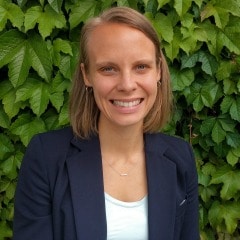
Teaching in a Post-Truth Era: Supporting Students to Reason about Online Information
“Should I trust this?” When we’re online, we often find ourselves asking this question. Yet we are not adequately preparing young people to answer it. Digital literacy instruction has not kept pace with the Internet’s rapid advancements, and our complacency may exacerbate digital inequalities. Research-based approaches to teaching online evaluations are necessary to ensure that all students learn to find reliable information online.
My research addresses this need in two ways. First, I analyze task-based think-aloud interviews with high school students, working to understand how students reason about online information and identify ways to build on that reasoning in order to help them become thoughtful consumers of digital content. Second, over the course of a four-month design study, I worked with a classroom teacher to test and refine a set of curricular modules to teach students to evaluate online information. I analyze pre- and post-tests, classroom observations, student work, and collaboration sessions with the teacher to describe design principles that emerged and characterize students’ learning trajectories over the course of the study.
The strategies and knowledge required to find reliable digital sources are, increasingly, a requirement for informed and empowered participation in democratic life. My research challenges educators to take seriously the task of teaching students to evaluate online information and outlines a potential instructional path forward.
Alyssa Morley, Michigan State University
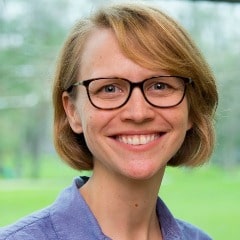
Alyssa Morley is a Ph.D. Candidate in Education Policy at Michigan State University with interdisciplinary concentrations in Gender Studies and International Development. Through her research, Alyssa explores how the lives of teachers intersect with education policies. Her current work is driven by an interest in what it means to be a “teacher,” how these meanings are culturally produced, and how they interact with policy frames of teachers and teaching. These questions grow from Alyssa’s experience as a U.S. Peace Corps teacher in Malawi. Alyssa’s dissertation examines the intricacies of primary school teaching in Malawi and was funded by an award from Fulbright-Hays Doctoral Dissertation Research Abroad. Her Chichewa language training has been supported by a Foreign Language Area Studies fellowship. Alyssa holds B.A. Degrees in Anthropology & Sociology from Elon University.
Reimagining Teachers’ Work: The Everyday Creativity of Primary School Teachers in Malawi
Given the competing imperatives assigned to education systems and teachers across the world, it is crucial to develop ways of thinking about policy that acknowledge the complexity of what it means to be a teacher. This is particularly true in Malawi, where primary school teachers are viewed as integral actors in catalyzing student learning, promoting girls’ empowerment, and implementing health reforms. Further, teachers’ work in Malawi is characterized by salient tensions: As a profession, teaching has steadily depreciated in status, pay, and desirability. Yet, as individuals, teachers are central to international development projects that assume they are role models for youth. This dissertation examines how teachers navigate the crowded and conflicting policy space of their work. Through employing the concept of “everyday creativity,” I investigate how teachers imaginatively operate with(in) constraints—often policy-generated—that shape their work and livelihoods. Drawing on ethnographic data, this study reveals the creativity of individual teachers, the shifting terrains of teacher-related policy, and how teacher lives and policy are interwoven.
Cindy Nguyen, University of California, Berkeley
Cindy Nguyen is a doctoral candidate in the department of History at University of California, Berkeley. She specializes in the cultural and political history of Vietnam, print culture, and knowledge institutions such as libraries, archives, schools, and museums. She approaches history through a critical lens of both “builders and users” to understand the multifaceted roles of library actors (librarians, readers, technicians, administrators) to shape the meaning of libraries, popular education, and literacy in 20th century Vietnam. Her research topic and theoretical approach draws from an interdisciplinary training and work experience—as an area studies specialist, multilingual scholar (English, Vietnamese, French), and digital humanist (information science, libraries, and archive work at Information Services & Technologies at UC Berkeley and the University Archive at MSU). She received her Bachelor’s of Arts at University of California, Los Angeles and a Master of Arts at Michigan State University.
Nguyen’s research informs and is informed by her art and personal history. Nguyen’s body of work includes award-winning multimedia film, poetry, visual art, and essays on the topics of translation, memory, and feminism (mis-reading.com). Her interdisciplinary work bridges the diverse fields of history, technology, education, art, and language. As a refugee from the Vietnam War and English as a Second Language Learner, she is committed to advance the understanding of the complex history and culture of Vietnam as well as intergenerational memory and language. Nguyen has also worked internationally through collaborations with universities and libraries in Vietnam (Fulbright Scholar 2017), France, and the United States. She is committed to advance the mission of education, information literacy, and libraries development, especially within underrepresented communities in Vietnam and the United States.

Builders and Users: Education, Modernity, and the Nation through the Vietnamese Library (1887-1975)
Cindy Nguyen’s dissertation examines the cultural, educational, and political history of libraries in Vietnam from 1887 to 1975. How does the library develop as an institution of public education, literacy, and information? In what ways do different political regimes throughout twentieth century Vietnamese history–French colonialism (1887-1954), Vietnamese Communism (1954-present), and anti-Communism republic (1954-1975)—envision the role of libraries in relation to (1) public education (2) control and access to information and (3) modern nationhood? By focusing on the long, complex, and important history of Vietnamese libraries, my research impacts the fields of Vietnamese history, library and information science, and education research. For education research, Nguyen contributes an important and understudied perspective on popular and alternative spaces of learning; also she demonstrates the Vietnamese case of public education and cultural library policy under different political and historical regimes.
Oscar Patrón, University of Pittsburgh

Oscar E. Patrón is a PhD candidate in Administrative and Policy Studies in the School of Education (SOE) at the University of Pittsburgh (Pitt). As an aspiring faculty, Oscar has worked in a variety of roles while at Pitt––from being a teaching assistant to serving on the SOE’s academic and student affairs committees. Upon his arrival at Pitt, Oscar joined his advisor’s, Dr. Gina A. Garcia, research team, where they conducted a mixed-methods multi-site investigation examining the leadership development of Latinos in college. They are now working on the Midwest Hispanic-Serving Institutions Study.
Currently, Oscar is a visiting pre-doctoral scholar and research associate in the Race and Equity Center at the University of Southern California (USC), where he has served as a teaching assistant for Dr. Shaun Harper’s Race in Education course. While at USC, Oscar is completing his dissertation, which investigates the resilience processes that queer Latino collegians undergo in relation to their social identities and surrounding contexts.
Oscar completed his BA from the University of Illinois at Urbana-Champaign (U of I), double majoring in Sociology and Latinx Studies. Oscar’s passion for research started from his participation in the Ronald E. McNair Scholars program while at the U of I, where he presented his research on the complexities of identity and labels regarding the Latinx population at various conferences. Oscar has also been awarded the K. Leroy Irvis Fellowship, Provost Development Fund, and was recognized as an American Association of Hispanics in Higher Education Fellow.
Queering while Racializing Traditional Conceptions of Resilience through the Experiences of Queer Latino Collegians
Latino males have been at the center of policy deliberation and educational reform in recent years. Although they have been labeled as vanishing from higher education, there has been a consistent increase in Latino male enrollment since 1976. As such, I take an asset-based approach that simultaneously provides a more nuanced understanding about Latino men than the negative and pathologizing portrayal found in mainstream media and recent literature. This study explores the heterogeneity within this group by examining the experiences of resilient queer Latino male collegians, a group that has been largely overlooked in this realm of scholarship and that is known to encounter a series of challenges as a result of the intersection of their multiple identities. Drawing from a conceptual framework that has been mainly defined by psychologists and psychiatrists, I explore the ways queer Latino males undergo a process of resilience while investigating potential limitations in the way such framework has been defined and applied, particularly in relation to race/ethnicity and sexuality. This qualitative investigation employs narrative as the guiding methodology, paying close attention to student experiences through life stories. Data derives from a national sample of queer Latino males from different colleges and universities throughout the United States, particularly drawing from three forms of data collection including, 1) two semi-structured interviews per participant, 2) online responses and group discussions to specific prompts via a private social media page, and 3) the collection of pictures. Practical and theoretical implications are discussed.
Stacy Priniski, University of Wisconsin-Madison
Stacy Priniski is a PhD candidate in Social Psychology and fellow in the Interdisciplinary Training Program in Education Sciences at the University of Wisconsin-Madison. Her research focuses on how targeted social-psychological interventions based in motivation theory can be implemented to promote equitable outcomes in higher education, especially for first-generation college students and students of color. Her particular area of expertise is value-based interventions that focus on two types of values: the value that students find in the topics they are studying and students’ own personal values. Stacy studies the ways in which these two types of values shape students’ experiences in college and how interventions can leverage those values to improve educational outcomes. She investigates these processes both in the laboratory and in large-scale, randomized controlled trials in the field. Most recently, Stacy has been working on projects assessing the values and goals of underrepresented students in a variety of educational contexts (two-year colleges, regional universities, and research universities in varied geographical areas of the United States), and developing interventions for underrepresented students in each context. Her work has been recognized by the Motivation Special Interest Group of the American Educational Research Association through the Paul Pintrich Memorial Award.

Helping Underrepresented Students Find Prosocial Value in STEM: An Intersectional Approach to Utility-Value Interventions
Recent research suggests that a utility-value intervention in which students write about the usefulness of what they are learning for achieving prosocial goals (e.g., giving back to one’s community) could be particularly motivating for first-generation and underrepresented racial/ethnic minority students. Such an intervention could help to address achievement gaps in STEM, but what is the best way to have students write about prosocial utility? My dissertation involves three studies to investigate the impact of different types of prosocial utility-value writing, using mixed methods. Study 1 is a survey study with introductory biology students to examine the nature of underrepresented students’ prosocial goals, using an intersectional approach considering both race and social class. Study 2 is a laboratory study in which I directly manipulate the type of prosocial utility students write about (utility for helping family, community, or society). Finally, Study 3 is a qualitative study in which I conduct content analyses of essays from an ongoing utility-value intervention study in introductory biology courses. Students are given a general prosocial utility prompt about connecting the material to helping “other people.” I explore which types of prosocial utility students choose to write about and whether particular prosocial themes are predictive of interest, course performance or career plans, again using an intersectional approach. These studies can inform the development of an intervention toolkit for STEM educators to promote equitable outcomes by helping their students see the prosocial value of STEM.
Celene Reynolds, Yale University

Celene Reynolds is a PhD candidate in the Department of Sociology at Yale University. She is primarily interested in how laws come to be used and understood differently in organizations over time. Educational organizations, specifically colleges and universities, have been her main focus thus far. Celene’s research is supported by the National Science Foundation and the Horowitz Foundation for Social Policy and recently won the Sally Hacker Graduate Student Paper Award from the American Sociological Association’s Sex and Gender Section. Her work has appeared in Social Problems, Organization, Qualitative Sociology, and Socius. Prior to joining Yale Sociology, she worked in philanthropic management consulting. Celene holds a B.A. in Sociology from Wellesley College and M.A. in Social Sciences from the University of Chicago.
From Unequal Play to Unwanted Contact: Title IX in U.S. Colleges and Universities, 1972-2016
Title IX, the U.S. civil rights law that prohibits sex discrimination in education, has been called one of the most significant steps towards gender equality in the last century. For decades, it was understood as the law that encouraged women’s participation in collegiate athletics. But today it is interpreted and applied almost completely differently. Title IX is increasingly mobilized in response to the problem of sexual harassment, including assault, on college campuses. My dissertation examines the processes and causes of the changing use of Title IX in the three primary organizational settings where it is enforced: the Department of Education Office for Civil Rights, the courts, and on the local level of colleges and universities. I draw on quantitative and qualitative data, including an original data set of all federal Title IX complaints filed with the Department of Education since 1994, lawsuits that transformed the meaning of Title IX, and in-depth case studies of the law’s application at Yale University and the University of California-Berkeley. The project illuminates a striking change affecting campus life across America, contributes to social scientific debates about how law shapes society and vice versa, and generates knowledge crucial for strengthening higher education’s capacity to reduce social inequality.
Natalia Rojas, New York University
Natalia Rojas is a doctoral candidate in the Psychology & Social Intervention program in the Department of Applied Psychology at NYU Steinhardt working with Hirokazu Yoshikawa and Pamela Morris. Natalia works at the intersection of social policy, practice, and developmental psychology. Her research interests are a direct response to the gap in systems-level conceptualizations of early childhood education. At the foundation of her research is an interest in understanding the factors at the district, program, and classroom levels associated with preschool classroom quality. Within her work examining the broad and complex set of ecological factors that influence classroom quality, Natalia’s concentration on immigrant-origin children focuses the lens on a subpopulation of a particular policy and public interest. Examples of this work include a research-practice partnership with NYC district leaders to use and conduct research in the context of NYC’s Pre-K for All initiative and a collaborative project with the New York Immigration Coalition. Her dissertation analyzes the quality of interactions between teachers and immigrant-origin children within classrooms, their associations with school readiness outcomes, and explores whether specific practices for immigrant-origin children are used in preschool classrooms.

Challenging the Definition of “High-Quality” Preschool for Dual Language Learners: Implications for Practice and Measurement
As the number of dual language learners (DLLs) in early care and education (ECE) programs increases, it is critical to examine whether the quality of practices in these settings reflect the needs of the diverse groups of children being served. High-quality ECE experiences have positive effects on DLL children’s early development and learning. However, even among those who attend high-quality ECE programs, DLLs begin kindergarten at an academic disadvantage relative to their non-DLL peers; the gap widens as children grow older. Likely this is because high quality in the ECE literature has never been conceptualized in a way that is specific to the experiences of DLL children. In order to tackle the school readiness gaps between DLL and non-DLL children, both what is universal to all children and what is specific to the needs of DLL children should be taken into account when defining a high-quality classroom.
My dissertation addresses these limitations through two studies focused on the specific quality of instruction experienced by DLLs in ECE. In my first study, I will employ multilevel models to understand the quality of teacher-child interactions experienced by DLL and non-DLL children and their associations with children’s school readiness outcomes. Study 2 aims to develop and pilot the first child-level measure of quality that specifically addresses the unique needs of DLL children. The two studies together will deepen our understanding of the variability of interactions within classrooms across DLL and non-DLL children and determine whether DLL-specific practices are being used in ECE classrooms.
Zuchao Shen, University of Cincinnati
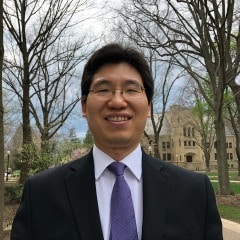
Zuchao Shen is a doctoral candidate in the Department of Educational Studies at the University of Cincinnati. His current research centers on the development of methods that support rigorous and efficient observational, quasi-experimental and experimental designs in education and social sciences with a specific focus on multilevel structures such as those commonly seen in schooling (e.g., students nested within schools). He is also interested in methods that investigate and support large-scale complex data modeling (e.g., machine learning, missing data, and matching). His substantive research interests are in school reform, educational equity, program evaluation and policy analysis. His work has appeared in Multivariate Behavioral Research, Studies in Educational Evaluation, Evaluation Review, School Effectiveness and School Improvement, and other journals. He was a three-year recipient of a Hazel F. Gabbard Doctoral Research Associate Scholarship from University of Cincinnati. Prior to coming to University of Cincinnati, Zuchao earned his M.A. in Economics of Education and Educational Administration from Peking University and subsequently worked for four years in marketing research and consulting companies in China.
Optimal Sample Allocation in Multilevel Experiments
One key consideration in designing multilevel randomized trials is to ensure that designs have desired chance to detect treatment effects if they exist. Given a fixed budget and cost structures, three are sample sizes allocated across levels and treatment conditions that can maximize these chances or statistical power. However, literature investigating optimal sample allocation has largely been limited in the types of parameters it considers to be malleable (e.g., balanced and/or constrained designs). Furthermore, the lack of power analysis tools explicitly accommodating costs and budget may discourage thoughtful consideration of the cost-efficient design strategies in the planning stage. This project addresses this gap and will cover optimal sample allocations for two-, three-, and four-level (multisite) cluster-randomized trials. For each type of trial, I will derive the optimal sample allocation when sampling costs vary across treatment conditions and levels of hierarchy. I will also investigate the robustness of the derived optimal design parameters to the misspecification on initial values of cost structure and design parameters. The preliminary results for two-level cluster-randomized trials show that the proposed framework can identify sample allocation with more power than previous frameworks under the same budget, and the derived optimal design parameters are fairly robust to the misspecification on initial values of cost structure and design parameters. I am also developing an open-source R package odr (https://cran.r-project.org/package=odr) to implement proposed methods and power analyses accommodating costs and budget, which will help researchers design more cost-efficient and rigorous multilevel experiments.
Michael Singh, University of California, Berkeley
Michael V. Singh is a Ph.D. candidate in the Graduate School of Education at the University of California, Berkeley. He is also a graduate fellow at the Institute for the Study of Societal Issues as well as a member of the Designated Emphasis program in Women, Gender, & Sexuality. Michael’s doctoral research explores the ways neoliberal logics surrounding urban education inform the ways race, gender, and sexuality are conceptualized, embodied, and at times resisted in a Latino male mentorship program. His work provides a timely addition to the growing research on boys of color and calls for a critical and intersectional engagement with the cultural politics of specifically Latino masculinity. An article based on his dissertation pilot study, titled “Role models without guarantees: Corrective representations and the cultural politics of a Latino male teacher in the borderlands,” was recently published in Race Ethnicity and Education.
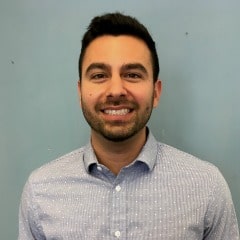
Becoming Neoliberal Subjects: Resistance and Complicity in a Mentorship Program for Middle and High School Latino Boys
The current educational crisis of Latino young men and boys has led to a proliferation of school district and community programs seeking to remedy the achievement gap experienced by Latino boys through Latino male mentorship programs. Indicative of neoliberal shifts in Latinx education, these programs often involve public-private partnerships and assume an individually damaged Latino boy in need of technocratic and innovative solutions, rather than structural changes. My work enters this conversation on boy of color mentorship through an ethnographic case study approach, examining one Latino male mentorship program in an urban school district in California. Data collection for this study include interviews with administrators, philanthropists, mentors, and students, document and media analysis, as well as a full-year of participant observations in three different school sites in which the mentorship program operates. Preliminary findings reveal the ways neoliberal logics frame the goals of the program, pathologizing identity practices seen as unproductive, and discursively constructing an idealized Latino masculinity that was deemed respectable, individualistic, entrepreneurial, and both heterosexual and patriarchal. Furthermore, participant observations illustrate the way these neoliberal values become animated and normalized by mentors and boys through a variety of practices in the everyday routines of the program. Despite the pervasive presence of neoliberal framing of the problems of Latino boys, my research also uncovers moments of resistance, highlighting the ways both mentors and students attempt to refuse neoliberal logics and promote alternative framings of Latinx education.
Sabrina Solanki, University of California, Irvine

Sabrina Solanki is a Doctoral Candidate at the University of California, Irvine. Her research focuses on higher education policy, teacher effectiveness, STEM education, and the evaluation of education interventions.
Sabrina received her B.A. in Economics from the University of California, Los Angeles. While serving as an academic counselor through the UCLA Early Academic Outreach Program, Sabrina developed an interest in working with young adults. This experience motivated her to continue to impact young adults by becoming a public high school teacher after graduating with her MAT at the University of California, Irvine. Sabrina developed the economics program at Beckman High School, where she taught AP Microeconomics for several years. Sabrina’s experience as an educator allowed her to work with a diverse group of students. In doing so, she saw the challenges that the education system faces in educating all students equally. This motivated her to seek to better understand the problems in our education system and how to evaluate effective, evidence-based solutions. Prior to beginning her Ph.D., Sabrina received her Master’s in Public Policy from UCI. Her capstone project revolved around the impact of University Bridge Programs on college success for low-income, first-generation students.
As a Ph.D. student, Sabrina has spent her time working on a number of diverse research projects that focus on improving the college experience and learning outcomes for students, using both quasi-experimental and experimental designs. She is currently completing her dissertation which is an evaluation of a two-year learning communities program for incoming Biological Sciences majors and its impact on both academic and non-academic outcomes.
Do Learning Communities Work in STEM Education? Evaluating the Impact of the Enhanced Academic Success Experience (EASE) Initiative on Student Success
Low rates of STEM persistence in college have called upon researchers, policymakers, and higher education administrators to consider and evaluate effective, evidence-based solutions. Although an extensive theoretical literature and qualitative evidence points to learning communities as a promising strategy to improve persistence and academic success in college, rigorous quantitative evidence on the impacts of these programs in STEM education is limited. My dissertation provides an evaluation of a two-year learning communities program for incoming Biological Sciences majors at a large public university in California. The program – the Enhanced Academic Student Experience initiative (EASE) – groups hundreds of incoming Biological Sciences majors into cohorts of 30, co-enrolls these student cohorts in all first-year Biology and Chemistry courses, and provides participants with study skills support, increased academic counseling, and weekly meetings with a mentor. Selection into the program is determined by a strict cutoff on SAT math scores, which provides an opportunity to assess the impact of EASE with a regression discontinuity design (RD). Preliminary analyses of the 2016 entering cohort show excellent compliance with the selection cutoff and promising short-run impacts. The proposed study will take advantage of data being collected during the current academic year to: i) examine longer-term outcomes such as two-year cumulative GPA and two-year retention for the 2016 cohort; ii) conduct a replication study of one- and two-year outcomes using data from the 2017 entering cohort; and iii) include in the replication study analyses of social-psychological outcome measures to understand the process by which students may benefit from learning communities.
Nadine Tanio, University of California, Los Angeles
Nadine Tanio is a doctoral candidate in Education at UCLA’s Graduate School of Education and Information Studies. She earned a bachelor’s degree in Psychology and History at UCLA and her Master’s in Sociocultural Anthropology at UC Berkeley before working in documentary and public television. Nadine is interested in education as a tool for social justice, health and well-being. Her dissertation uses a participatory approach that engages young people as critical thinkers in creating peer-to-peer teaching and learning videos.

Learning to Care: How Young Heart Transplant Patients Transition to Adulthood
Heart transplantation is unique to high-tech medicine and remains an experience unknown to all but a few. My work explores how young heart transplant patients envision, articulate and navigate their transition from pediatric to adult medical care. In other words, it focuses on how young people learn to care for themselves in the context of modern medicine where biotechnological advancements, like organ transplantation, are transforming our understanding of our bodies and ourselves through the melding of human physiology with medicine.
This study is a collaborative project. It aims to produce short educational videos that youth participants can use and share within their communities, while identifying opportunities for educators, caregivers and health care professionals to support young people through their transition. All transitions are imbued with risk and possibility, but for transplant recipients transition from pediatric to adult care is a decidedly perilous time when adolescents and young adults have higher mortality rates than their younger cohorts. Through educational research I explore narratives of positionality, practice, knowledge production and pedagogy aimed at building communities for learning and living within the transitory spaces of high-tech modern medicine.
Kate Turetsky, Columbia University

Kate Turetsky is a doctoral candidate in Psychology at Columbia University. Her research employs social psychological interventions and social network analysis to understand and address real-world problems related to group identity, stigma, and psychological threat in educational settings and beyond. These problems include high dropout rates in the sciences, undertreatment of mental health issues among college students, and prejudice toward minority groups. Kate’s research has been funded by a National Science Foundation Graduate Research Fellowship. In addition to her research, Kate cofounded the first annual national conference on designing, implementing, and evaluating social psychological interventions through the Society for Personality and Social Psychology, directs the Lobel Undergraduate Research Fellowship program in the Psychology Department at Columbia, and serves as a Lead Teaching Fellow through the Columbia University Center for Teaching and Learning. Kate earned her B.A. in both Psychology and Studio Art from Amherst College in 2012, and spent the following year as a research fellow in a neuropsychology lab at the National Institute of Mental Health.
When the Going Gets Tough, the Tough Get Social: Building Stressed Students’ Social Networks Shapes Academic Persistence and Success
Helping students thrive and persist in science, technology, engineering, and math (STEM) majors is critical as the demand for STEM professionals increases. Whereas most research aims to improve student outcomes by building individual resources, such as cognitive and noncognitive skills, my dissertation focuses on building students’ social resources to help them persevere and thrive in academic settings. Across four studies, I explore whether building students’ social networks—the system of interpersonal relationships in which individuals are embedded—through brief, low-cost social psychological interventions can promote persistence and success over time in difficult STEM settings. Study 1 examines students’ social networks and academic performance in a STEM course that implemented a collaborative learning intervention. Study 2, a field experiment in a “weed-out” biology course, tests the effects of a randomly assigned affirmation intervention on students’ social networks and persistence in STEM. Study 3 aims to replicate and extend Study 2 in order to test the robustness of the intervention’s effects on social networks and retention. Finally, Study 4 is a laboratory experiment testing a novel social psychological intervention promoting positive social responses to academic stress. Results suggest that strengthening students’ social networks in STEM courses is a promising route forward for improving performance and retention. Broadly, this work highlights the importance of the social context in which students learn, and makes conceptual, methodological, and practical contributions to the study of social networks and their powerful influence in educational settings.
Shakara Tyler, Michigan State University
Shakara Tyler is a returning-generation farmer, seedkeeper, educator, and researcher and community organizer. She is a PhD candidate at Michigan State University studying agroeoclogical education and Black agrarianism in the Department of Community Sustainability. She has worked with the MSU Center for Regional Food Systems as the Underserved Farmer Development Specialist where she provided technical assistance to underserved farming groups such as farmers of color, women farmers and beginning farmers as well as developed research agendas focused on better supporting these communities. As part of her academic studies, she explores participatory and decolonial research methodologies and community-centered pedagogies in the food justice and food sovereignty movements. She serves as a board member of the Detroit Black Community Food Security Network (DBCFSN), a coordinating member of the Black Dirt Farm Collective in Maryland and an educational research consultant with the Southeast African American Farmers Organic Network (SAAFON) in Georgia. Through these roles, she works with communities to explore agroeoclogical pedagogies as tools in building community self-determination and anticolonial realities. Upon completion of her PhD, she intends to continue her work as a faculty member in the academy where she can engage in ecology, social science and the arts along the intersections of research, teaching and community engagement.

The Pedagogy of Black Agrarianism: A Process of Recovery
Black agrarianism is a pedagogical thought, praxis, and social movement rooted in land, food, freedom, and sovereignty. The pedagogies of Black agrarianism take many forms and remains an unexplored research subject in academia and an under-discussed topic in Black agricultural communities. From a historical point of view, this study interrogates the historical record of Black agrarian pedagogies by asking: What are the historical pedagogies of Black agrarianism? Through a historiography of Black agrarian educational institutions, 13 oral history interviews and archival research focused on Tuskegee University, the Federation of Southern Cooperatives, Fannie Lou Hamer’s Freedom Farm Cooperative and the Free Southern Theater provide insight into the historical layout of Black agrarian pedagogy. From a present-day point of view, this study interrogates the current manifestation of Black agrarian pedagogies by asking: What are the contemporary pedagogies of Black agrarianism? Through a participatory case study with D-Town Farm of the Detroit Black Community Food Security Network (DBCFSN), 19 semi-structured interviews with D-Town Farm volunteers and staff and participant observation of the farm educational events provide insight into the contemporary layout of Black agrarian pedagogy. From an introspective point of view, the study centers the intersectional “I” in the research process by asking: What are the self-reflective pedagogies of Black agrarianism? Autoethnographic fieldnotes provide insight into my role as a pedagogical actor in this pedagogically-oriented research. The general warrant of this participatory inquiry is to explore the pedagogies of Black agrarianism as an example of community-centered agricultural education. As a form of participatory inquiry, it fosters a transdisciplinary understanding of what Black farmer education looks like in order to build more effective educational programs, particularly in urban agricultural environments.
Yolanda Wiggins, University of Massachusetts

Yolanda Wiggins is a doctoral candidate in the Department of Sociology at the University of Massachusetts Amherst. She received her B.A. in Political Science and Women’s Studies from West Virginia University. Her research interests center on family, higher education, and race, with a focus on how Black college students engage in a balancing act of academic responsibilities and family obligations. To assess the involvement of families in the lives of college students, her dissertation triangulates three sets of data: in-depth interviews with Black undergraduate men and women, their mothers who act as links to other kin, and college personnel, who are on the “front line” interacting with families, in a wide-range of on-campus offices to obtain an institutional perspective on the ways such offices either bridge the gap or separate families, students, and the university. Her research suggests that both family and college sometimes act as ‘greedy institutions,’ central to class production and reproduction projects, pulling students in different directions—the collective responsibilities to family may hinder the college experience, but at the same time, the college experience may hinder the fulfillment of family obligations. Her dissertation, publications, and presentations capture how family involvement often leads to an uneven playing field for students in higher education and how that process varies by race and class. She addresses policy suggestions on the ways post-secondary institutions can create a more equitable environment for underserved students and their families. Yolanda is a native of Washington, D.C. and a former Ronald E. McNair Scholar.
When the Family Goes to College: How Black Students Juggle Tensions Between Home and School
While researchers have documented the numerous structural barriers Black college students encounter throughout the educational system, researchers have not adequately investigated the role that the family and family obligations play in the higher education process. The proposed dissertation focuses on these familial relationships. I argue that Black students’ responsibilities to their mothers, fathers, and other extended and fictive kin create tradeoffs they must navigate as they try to juggle the demands of college with ongoing demands from family. To assess the involvement of families in the lives of college students, this dissertation will include three tiers: the first two are 51 in-depth interviews with Black undergraduates and 50 in-depth interviews with their mothers, in which I will examine both students’ and their mother’s accounts of interactions, the kinds of support exchanged, and expectations about college and family ties; the third tier includes 33 in-depth interviews with college personnel to provide and institutional perspective on the ways in which these offices interact with families and shape policy to address their concerns. My research questions are: 1) What do college students give to their families and how do they understand their familial expectations, responsibilities, and the support they give to kin? 2) What do families give to students and how do they perceive college demands and their children’s familial responsibilities? 3) To what extent and in what ways are college personnel assisting Black families? 4) How do these patterns vary by class and gender among Black college students? 5) How do such exchanges – from students to families and from families to students – affect college success and family dynamics? Preliminary findings suggest Black students’ commitment to collective, familial, and individual goals reinforces inequality in a college context that remains unresponsive to those demands. This dissertation offers a critique of standard views of the family and demonstrates a need for expanding our understanding of the strategies and institutional mechanisms that colleges can employ to better support increasingly diverse Black families as a way to ensure student engagement.
Nicholas Wright, Georgia State University
Nicholas Wright is a Ph.D. Candidate in the Economics Department at Georgia State University. His research utilizes quasi-experimental methods to study issues in education, labor, and public economics, with a primary focus on higher education policies, experimental interventions, and student financing. His most recent works utilize administrative data from Jamaica to examine the impact of need-based financing policies, performance standards, and public recognition on students’ post-secondary decisions and labor market outcomes. Nic has served as a research assistant at the Federal Reserve Bank of Atlanta and has taught courses in econometrics and the economics of poverty and public policy at Georgia State University. Prior to Georgia State, he received a B.Sc. in Economics and Political Science and an M.Sc. in Economics from the University of the West Indies.

Need-Based Financing Policies, College Decision-Making and Labor Market Behavior
Designing an effective framework for financing higher education is a major issue facing policymakers in developed and developing countries. While we have a good understanding of how college financing options affect students’ college outcomes in developed countries, less is known about the impact of these programs in developing countries. In general, not much work has been done on how need-based financing programs alter students’ work-study trade-off and their labor market outcomes after college. In this paper, I employ several quasi-experimental designs and novel administrative data from Jamaica to estimate the effect of need-based grants and student-loan financing on students’ college outcomes and labor market behavior during college and in the early years after college. The results indicate that the students who benefited from either program had a higher GPA, graduated at higher rates and were more likely to remain in college beyond their third year. While both programs induce treated students to reduce labor market engagement during college, I found that they affected annual earnings differently in the early years after expected graduation.
Román Andrés Zárate Vásquez, Massachusetts Institute of Technology
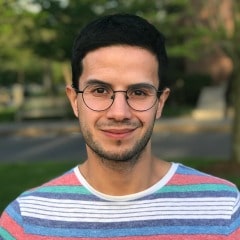
Román Andrés Zárate is a doctoral candidate in the Department of Economics at MIT. His primary research interests are in development and labor economics. He is a research associate at the School Effectiveness and Inequality Initiative (SEII), a research program in the MIT Department of Economics focusing on the economics of education. He is part of the team evaluating the effect of exam schools and affirmative action policies in Chicago. For his research, he conducted a Randomized Control Trial in Selective Schools in Perú to study the impact of cognitive and social skills of peers on educational outcomes. Zárate holds a B.A. and M.A. in Economics from Universidad de Los Andes in Colombia.
Social Connections and Peer Effects: Experimental Evidence from Selective Schools in Perú
This project aims to quantify the causal effects of being exposed to peers with higher cognitive and social skills. To identify these effects, I conduct an RCT in Selective High Schools in Peru. Students were classified into four types based on admission test scores and centrality measures of social networks: (i) Ch-Sh: high cognitive and high social, (ii) Ch-Sl: high cognitive and low social, (iii) Cl-Sh: low cognitive and high social, and (iv) Cl-Sl: low cognitive and low social. Conditional on the student’s type, they were randomly assigned to groups with different types of peers. These groups were used for the assignment to dormitories (2015-17 cohorts) and classrooms (2017 cohort) during the 2017 school year. I can use this variation to identify causal peer effects on social networks, standardized test scores, and non-cognitive skills.
